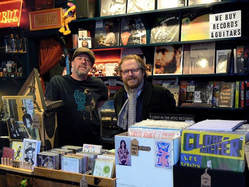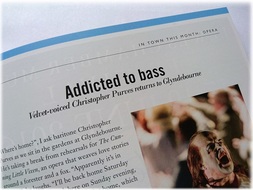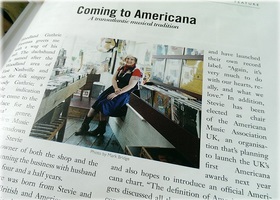“I just loved the powerful sound of a squeezebox in full flight”, Cohen Braithwaite-Kilcoyne tells me. “I loved the idea of being able to play tunes with rich and complex accompaniments and countermelodies, which is possible on concertinas and melodeons – not so much on the violin.” The timing couldn’t have been better, as he’d just started to develop an appreciation of English folk songs. “It’s the music that I like, the music that I feel the strongest connection to and the music that has had the strongest effect on me. I love the unusual melodies, the captivating narratives to songs and the fascinating history that comes with every piece.”
Barely a decade has passed since Cohen fell for the concertina, the melodeon and the traditional music he plays on them. In that time, he’s won Bromyard Folk Festival’s Future of Young Folk Award, he’s studied with ‘one-man folk industry’ Pete Coe and he’s graduated from the University of Leeds with a BA in Music. These days he’s playing on his own and with the band Granny’s Attic, although it’s the solo Cohen who’s coming to Lewes this month, performing in the evening of Saturday 13th after running a melodeon workshop during the day.
“It’s fair to say that I have learnt a huge amount from other players, including John Kirkpatrick, Pete Coe, John Spiers, Brian Peters and Adrian Brown”, Cohen explains. He’s also investigated how concertinas and melodeons were played when they originated around 200 years ago. One such technique involves vigorously moving the instrument in a circle whilst playing it: perhaps the Victorian equivalent of plugging an effects pedal into an electric guitar. “There was a time when just about every concertina player was doing it, but now there are only a handful of us doing it. Essentially the movements through the air alter the sound of the concertina; it’s all to do with the Doppler Effect.”
But Cohen Braithwaite-Kilcoyne isn’t just an exceptionally talented player. He sings as well, with a rich, strong voice that’s well-suited to the traditional music he plays. “I always sang and played around the house, but it took me a while to be able to do it in public”, he admits. “I began singing and playing in public when I was about 17, so about four or five years after I started playing concertinas and melodeons.”
Yet all this would probably never have started without those free violin lessons at primary school. “That was my way into music. I honestly think that if they had not been on offer, I probably would not have ended up following this path as a musician.”
Cohen performs at the Elephant & Castle on Saturday 13th. Tickets £7 from the pub or via lewessaturdayfolkclub.org
First published in Viva Lewes magazine issue 151 April 2019



 RSS Feed
RSS Feed
